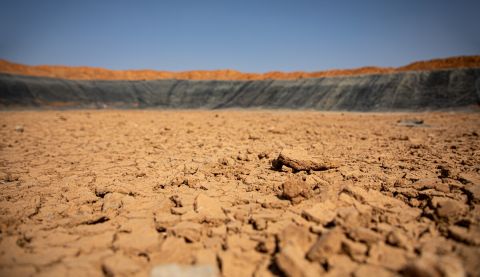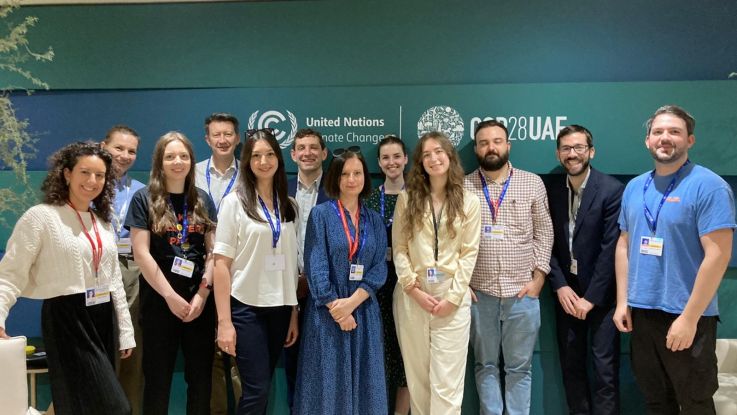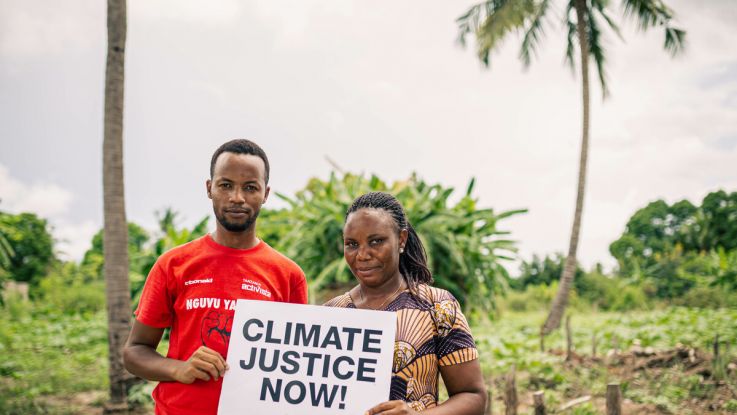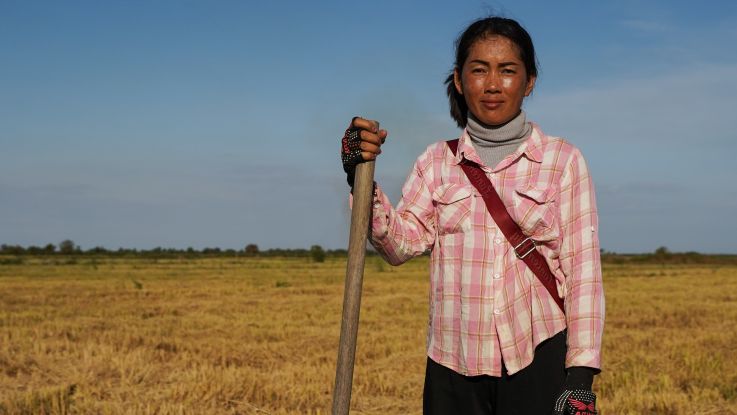Two global climate conferences, two failures of political leadership
26 June 2023

Once filled with over 150,000 barrels of water, this ActionAid-implemented earth dam in Beerato, Somaliland is now completely dry due to failed rains and increasing temperatures. Photo: Daniel Jukes/ActionAid
The climate dialogues in Bonn, also known as SB58, ended in a fizzle of low energy, frustration, and general disappointment.
The years of unfulfilled promises on climate financing by the nations that are historically most responsible for the climate crisis strained the negotiations across the two weeks, blocking progress. The lack of trust and the tensions between nations was palpable at the conference.
The PACT global finance summit in Paris last week followed the Bonn conference with hopes of transforming the global financial system and delivering climate financing. However, it ended on Friday - also in disappointment.
With tensions and frustrations running high, and the high stakes involved, there is no separating the technical from the political.
With COP28 looming in five months, the success of the climate negotiations and our future hang in the balance.
In Bonn a political battle - the ‘agenda fight’, defined this year’s conference and slowed negotiations. Countries fought over whether the Mitigation Work Program, aimed at increasing ambition on the phasing-out of fossil fuels, should be included within the two-week agenda.
Politicking between countries, and calls for nations to first honour commitments on the finance needed to fund a green transition, prevented constructive dialogue and agreement.
After nine days of stalemate, with just over 48 hours to go until the end of the conference, the agenda was finally adopted, but without the crucial Mitigation Work Program.
Whilst the Bonn dialogues are often considered to be more of a technical space, this agenda fight was a political one. But with tensions and frustrations running high, and the high stakes involved, there is no separating the technical from the political.
Finance, finance, finance
The lack of finance to support a just transition away from fossil fuels and polluting industries, and to support societies to adapt to climate change, fuelled much of the tensions and frustrations in Bonn.
A longstanding pledge by the countries most responsible for climate change to deliver $100bn a year by 2020 to support the communities, women and girls on the climate frontlines is yet to fully materialise.
Nearly $6 trillion globally each year go[es] towards subsidising fossil fuels and supporting harmful industries that overwhelmingly contribute to climate change and destroy our environment.
These countries are continuing to evade their responsibilities and are failing to demonstrate integrity or climate leadership.
And what is missing from this story is that this funding is just a drop in the ocean of what is needed in terms of finance to support countries to mitigate and adapt to climate change.
It is also a fraction of what polluting countries can afford, with almost $6 trillion globally each year going towards subsidising fossil fuels and supporting harmful industries that overwhelmingly contribute to climate change and destroy our environment.
Macron’s Paris summit last week, immediately following the negotiations in Bonn, was billed to address these issues. It rightfully sought to make financing for mitigating climate change, adapting to its effects, and addressing the losses and damages caused by its impacts, a key political priority of governments the world over.
Lack of ambition on grants
In Paris small steps were made to help countries facing extreme climate impacts - but the hopes and promises of transforming our global financial systems, restoring equity across countries and directing financing to climate resilience were not delivered on.
It is a matter of fairness, and is at the core of the climate justice debate. It is also a matter of necessity... We cannot create a climate resilient future without the finance to fund it.
Debt and loans are key to the conversations on climate finance, but outcomes from Paris lacked any ambition on these issues.
World leaders in Paris should have unequivocally agreed that finance for climate change needs to be in the form of grants – this did not happen. Loans will only further entrench the debt crisis, perpetuate climate vulnerability and prevent countries from being able to address its impacts.
It is a matter of fairness, and as at the core of the climate justice debate. It is also a matter of necessity. Without this finance we stand unable to mitigate and transform our economies, unable to adequately adapt to climate change’s increasingly erratic nature, or its impending impacts.
We cannot create a climate-resilient future without the finance to fund it.
The steep road ahead
Bonn left a bitter aftertaste, unfinished business, and unresolved issues. Last week’s PACT global finance summit did little to address the key issues and failed to live up to expectations.
Five months stand between now and COP28 – five months in which every day counts.
Between now and December, world leaders must:
- make progress on climate finance
- come to COP28 ready to provide what has been promised
- commit to greater finance for climate change in the years immediately ahead, and
- provide cast-iron roadmaps for when and how this financing will be delivered.
This is needed to restore trust and to enable the international climate dialogues to progress. This is needed for justice.
COP28 and the Global Stocktake
At COP28 we also have the conclusion of the first Global Stocktake of the Paris agreement. This is an opportunity to course correct, to keep 1.5 alive and to put us on a path to climate resilience and a healthy planet.
These international climate dialogues need to be driven less by nationalist perspectives and instead defined by our shared humanity and common goals. Decisions made must reflect the urgency of the climate crisis and its impacts in the real world on our communities, women, and girls the world over.
This stocktake needs to make clear where countries have failed, commitments have not been met, and where we as a global community have come up short.
Meanwhile it must also be forward looking, charting a clear and solid path to the end of fossil fuels, to increased action on adaptation and to a coordinated and just response to climate losses and damages.
The Global Stocktake is an opportunity we must seize or ignore at our own peril.
Our future hangs by a thread. These international climate dialogues need to be driven less by nationalist perspectives and instead defined by our shared humanity and common goals.
Decisions made must reflect the urgency of the climate crisis and its impacts in the real world on our communities, women, and girls the world over.
Learn about ActionAid's approach to climate justice
Find out more about climate crisis, its causes, and ActionAid's charity work helping women and girls to prepare for and adapt to the effects of climate change. Learn more about our work on climate change.
Climate justice: Download our report on loss and damage



